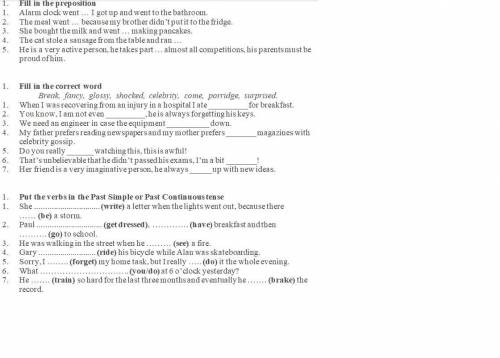1. Alarm clock went … I got up and went to the bathroom.
2. The meal went … because my brother didn’t put it to the fridge.
3. She bought the milk and went … making pancakes.
4. The cat stole a sausage from the table and ran …
5. He is a very active person, he takes part … almost all competitions, his parents must be proud of him.
1. Fill in the correct word
Break, fancy, glossy, shocked, celebrity, come, porridge, surprised.
1. When I was recovering from an injury in a hospital I ate for breakfast.
2. You know, I am not even , he is always forgetting his keys.
3. We need an engineer in case the equipment down.
4. My father prefers reading newspapers and my mother prefers magazines with celebrity gossip.
5. Do you really watching this, this is awful!
6. That’s unbelievable that he didn’t passed his exams, I’m a bit !
7. Her friend is a very imaginative person, he always up with new ideas.
1. Put the verbs in the Past Simple or Past Continuous tense
1. She (write) a letter when the lights went out, because there …… (be) a storm.
2. Paul (get dressed), …………. (have) breakfast and then ………. (go) to school.
3. He was walking in the street when he ……… (see) a fire.
4. Gary (ride) his bicycle while Alan was skateboarding.
5. Sorry, I …….. (forget) my home task, but I really ….. (do) it the whole evening.
6. What ………………………….. (you/do) at 6 o’clock yesterday?
7. He ……. (train) so hard for the last three months and eventually he ……. (brake) the record.

Другие вопросы по теме Английский язык
Популярные вопросы
- Запишите однокоренные слова в виде словообразовательной цепочки, учитывая...
2 - Напишите сочинение средний длинны на тему я будущие моей семьи 35 за самое...
2 - Вкнижке александра шибаева про язык читаем есть волшебные слова : скажешь...
2 - 1)укажите ,какие из чисел являются натуральными однозначными числами . 1)0...
3 - Как основался герб российской федерации...
1 - Как называется архитектурный памятник-крепость в москве, который был построен...
1 - Как пишется имя ольга по азбуке мне по информатике напишите...
1 - Послушала девочка спор говорит перестаньте спорить я вас всех люблю я целый...
2 - Выражение. 2(х+3)+5(х+1) следущее выражение 9(7+у)+8(6+у) следущее выражение...
1 - Open the brackets using the proper tense: 1. what you (to learn) for today?...
2
Explanation: When an alarm clock "goes off," it means that it starts ringing or making noise to wake someone up.
2. The meal went bad.
Explanation: When food "goes bad," it means that it becomes spoiled or unfit to eat.
3. She bought the milk and went home.
Explanation: In this context, "went home" means that she returned to her house.
4. The cat stole a sausage from the table and ran away.
Explanation: "Ran away" means that the cat quickly left the area or escaped.
5. He takes part in almost all competitions.
Explanation: "Takes part in" means that he participates or joins in those competitions.
1. For breakfast, I ate porridge.
2. You know, I am not even surprised, he is always forgetting his keys.
3. We need an engineer in case the equipment breaks down.
4. My father prefers reading newspapers and my mother prefers magazines with celebrity gossip.
5. Do you really watch this? This is awful!
6. That's unbelievable that he didn't pass his exams, I'm a bit shocked!
7. Her friend is a very imaginative person, he always comes up with new ideas.
1. She was writing a letter when the lights went out because there was a storm.
Explanation: The verb "was writing" expresses an ongoing action in the past, and "went out" is in the Simple Past tense.
2. Paul got dressed, had breakfast, and then went to school.
Explanation: The verbs "got dressed," "had," and "went" are all in the Simple Past tense, describing a sequence of actions in the past.
3. He was walking in the street when he saw a fire.
Explanation: The verb "was walking" is in the Past Continuous tense, indicating an ongoing action in the past, and "saw" is in the Simple Past tense.
4. Gary was riding his bicycle while Alan was skateboarding.
Explanation: Both "was riding" and "was skateboarding" are in the Past Continuous tense, indicating ongoing actions in the past.
5. Sorry, I forgot my homework, but I really was doing it the whole evening.
Explanation: "Forgot" is in the Simple Past tense, indicating a completed action in the past, and "was doing" is in the Past Continuous tense, describing an ongoing action in the past.
6. What were you doing at 6 o'clock yesterday?
Explanation: The phrase "were you doing" is in the Past Continuous tense, asking about an ongoing action in the past.
7. He trained so hard for the last three months, and eventually, he broke the record.
Explanation: "Trained" is in the Simple Past tense, describing a past action, and "broke" is also in the Simple Past tense, indicating a specific moment of breaking the record.